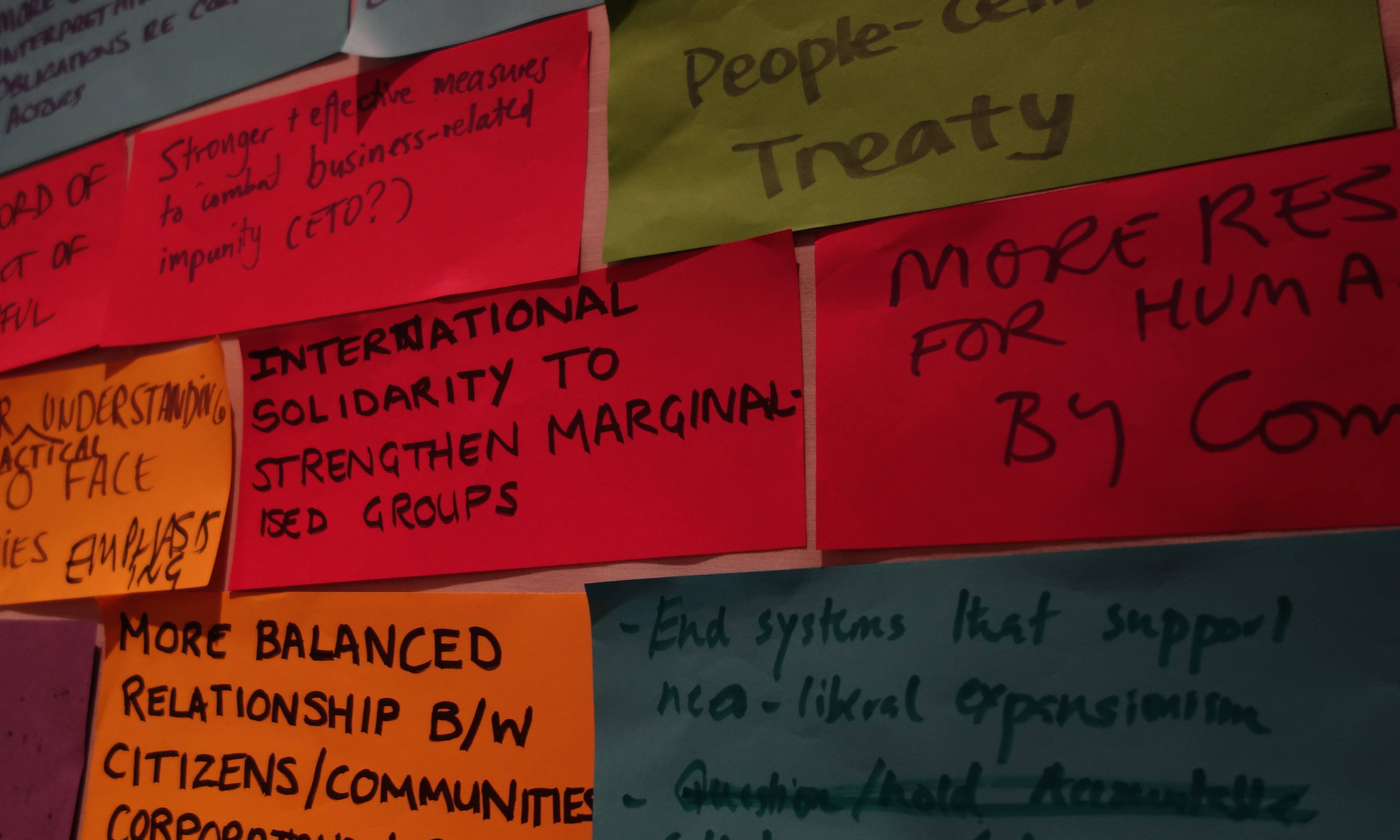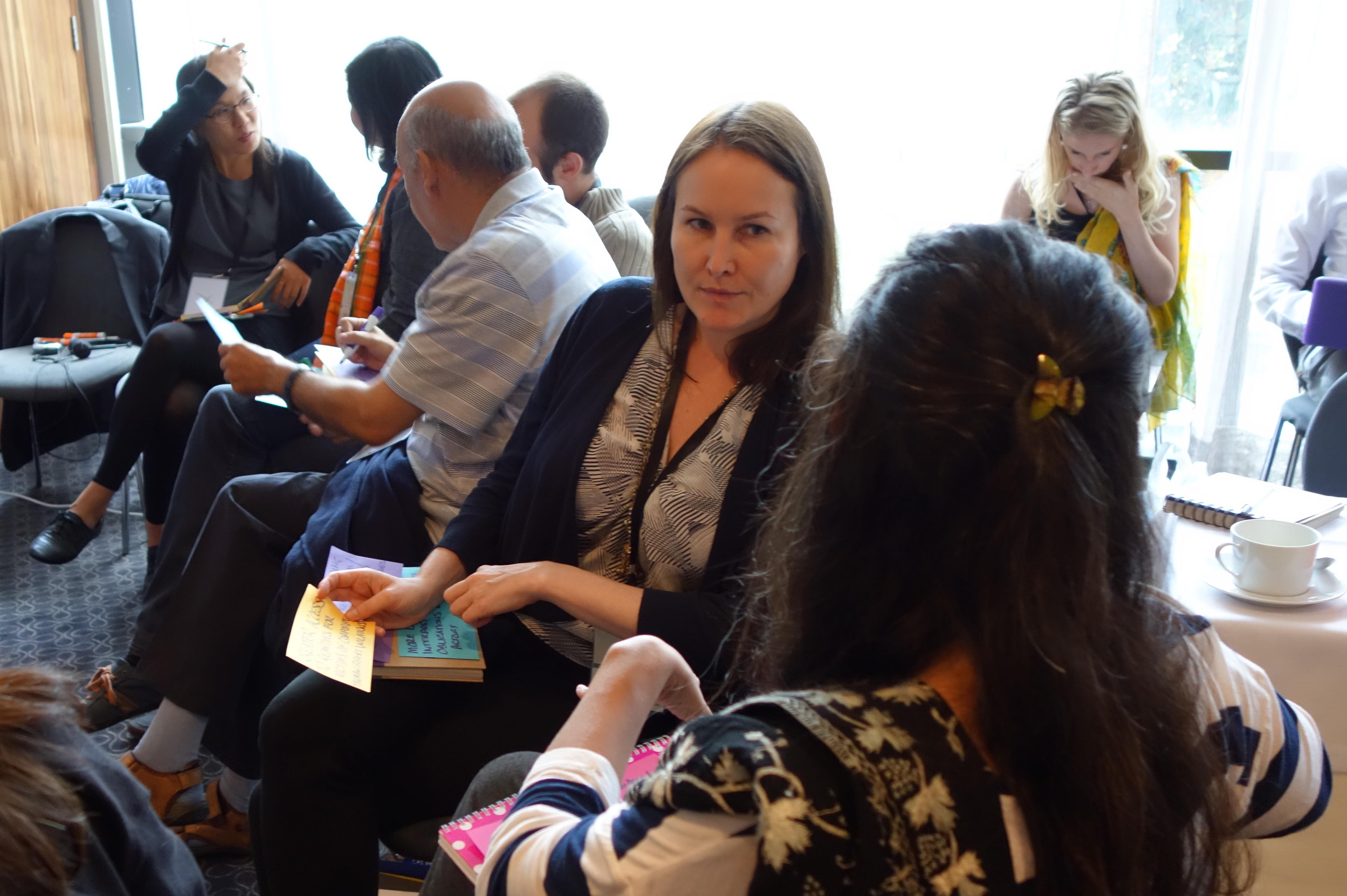Sessions
Day 2 - Tuesday, 27 October 2015
Transnational Network Strategies to Challenge Cases of Corporate Abuse
To counter way the global structure of modern corporations’ permit their violations of human rights we must be organize and coordinate globally, collaborative strategically across regions. By examining existing strategies being used in current cases of corporate human rights abuse, this session will explore the strategies used by civil society to effectively combat transnational corporate activities that impact human rights. This session will also consider the ways in which transnational civil society collaboration can more effectively harness the power of ESCR-Net’s membership to collectively support each other in these struggles in 2016 and beyond.

The forthcoming UN treaty to address corporate human rights violations poses opportunities, as well as challenges. This session will provide an update for members and partners on the progress made within the Network in the Treaty Initiative in 2015 (a project to support members and partners in many regions to participate in the design of the treaty and support the associated advocacy activities). The session will also be a chance to reflect on the views of members and partners on key issues arising in the UN treaty negotiations, and consider our collective perspective in light of upcoming 2016 activities. Please download this document on the Treaty Process.
Regional Advocacy Planning for the Treaty: Group Discussions and Report Back
This session builds on the previous Treaty Content Discussion session by creating space for participants of the Peoples’ Forum to review the advocacy activities taking place in their region, and plan what collective advocacy activities will be important to them in 2016. Participants will also share these plans with groups in other regions, and understand the global picture of what is happening in the coming year, and what groups in each region require to undertake these activities effectively. Please download here the Unity Statement produced in the Asia-Pacific Regional Consultation.
Day 3 - Wednesday, 28 October 2015
Parallel Session 1 (9-11)
- Corporate Capture. ESCR-Net members begun a Corporate Capture Project (CCP) in 2015 and this session will detail what stage this project is in. The project focusses on the One objective of the CCP is to provide leadership on the concepts of corporate capture for the wider corporate accountability community. As such this session will be a consultation with participants on the different elements of Corporate Capture being developing by the CCP, and examine whether they resonate with the local experiences of the participants present. The cases that are identified by the discussions may form part of ongoing research, as part of the CCP. The session will also be a chance for participants to see additional ways they can engage more thoroughly in the CCP in 2016.
- Undertaking Effective Documentation of Corp. HRs Abuses. Documenting corporate human rights violations is a key element in undertaking effective advocacy and establishing meaningful accountability. This session will assess the value for local groups of a documentation tool which has been developed by ESCR-Net members and the Business and Human Rights Resource Centre. In particular, the session will assess i/ whether the tool adequately deals with different contexts; ii/ how to manage expectations for groups using the tool; iii/ how to ensure clear next steps in place after documentation; iv/ how this initiative can incorporate other similar documentation tools being developed, and; v/ how would participants like this project to develop.
Parallel Session 2 (11.15 - 13.15)
- Human Rights Defenders. ESCR-Net members and partners continue to face ever growing threats and actions against their security. Firstly, this session will be a sharing of experiences regarding the different forms that threats take (particularly in the context of corporate human rights violations). The session will also be a sharing of strategies used by different groups to effectively address issues facing human rights defenders in different regions of the world.
- Strategies for Addressing Chinese Investment. Chinese foreign investment in Africa and all regions continues to cause numerous challenges to the realization of human rights. This session will draw on domestic Chinese knowledge to examine the opportunities available for civil society organizations to undertake more effective advocacy in the context of problematic foreign Chinese investment activities.
Parallel Session 3 (15.30 - 17-15)
 Gender, Land & Corporate Accountability in Africa. The members of society most affected by corporate related human rights abuses are very often women, particularly in the context of access to land and the resources derived from land. By examining the experiences of a community in South Africa, as a means to inspire cross-regional experience sharing from other participants, this session will explore the means by which women’s customary land rights can be protected, and communities can exert their rights to freely choose their own path to development.
Gender, Land & Corporate Accountability in Africa. The members of society most affected by corporate related human rights abuses are very often women, particularly in the context of access to land and the resources derived from land. By examining the experiences of a community in South Africa, as a means to inspire cross-regional experience sharing from other participants, this session will explore the means by which women’s customary land rights can be protected, and communities can exert their rights to freely choose their own path to development.- Local Human Rights Impacts of Global Trade Agreements. The impacts of global trade are manifest at the national and local level more than anywhere else. This session will explore the similarities and differences in these impacts, and ask what the human rights system has to offer in the struggle to address these impacts, and what we can do collectivity to amplify the impact of local and national advocacy activities.
